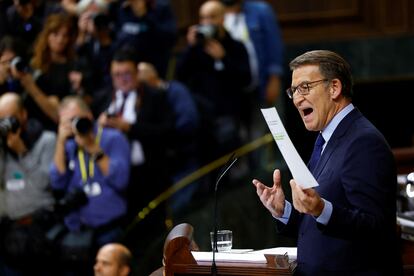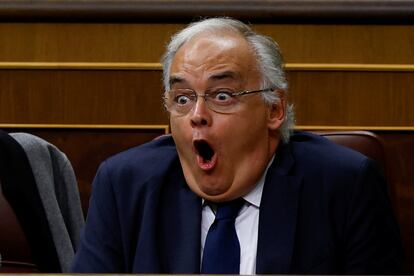At highly charged session, Spain’s PM justifies amnesty as only way to stop the far right
Pedro Sánchez faced withering criticism on the first of a two-day parliamentary debate that will end with a vote to confirm him as the new head of government
Spain’s acting prime minister, Pedro Sánchez, on Wednesday delivered a lengthy address inside a fractious parliament, where lawmakers had gathered for the first of a two-day debate that will end with a vote to confirm him as the new government leader following inconclusive elections in July.
The Socialist leader framed his bid to form a government as a way to contain the rise of the right: “The only wall against the far right has been the progressive coalition government in Spain.” He also insisted that a controversial amnesty bill favoring leaders of the 2017 failed secession attempt in Catalonia “will not be an attack on the Constitution, but an example of its strength.”
But Sánchez faced withering criticism inside the Congress of Deputies, where the opposition accused him of humiliating the country and trying to hold on to office at any price. “Making decisions that go against the general good in exchange for personal benefit is called political corruption,” said Alberto Núñez Feijóo, head of the mainstream conservative Popular Party (PP).

The highly charged investiture debate comes after days of street protests — including one attended by U.S. conservative political commentator Tucker Carlson — against an amnesty bill negotiated between Sánchez’s Socialist Party (PSOE) and Junts, the Catalan separatist party whose leader, Carles Puigdemont, fled to Belgium after leading the failed secession attempt of 2017. In exchange for the clemency, the seven lawmakers for Junts will play the role of kingmaker and vote for Sánchez to be the next head of government. Failure to produce a new government by late November would trigger a fresh election.
Sánchez went immediately on the attack and granted that he made the controversial concession to the Catalan separatists in order to form a new government thanks to their votes and those of a several other left-wing and regional parties. But he justified the move as a way to maintain progressive policies in Spain at a time when the far right is making inroads in many parts of the world. Spain’s ultranationalist Vox party, which secured 33 seats at the July election, has been a vocal opponent of the amnesty bill.
“We must bet on coexistence and [approve the amnesty] in order to consolidate the progress made in these last four years. Let’s not kid ourselves, the PP’s problem with Vox is not the amnesty, it’s the fact that they don’t accept the result of the election,” said Sánchez.
His argument builds on the fact that the main driver of Sánchez’s unexpected electoral success on July 23, when many considered him politically dead, was left-wing voters’ rejection of the far right. That rejection is the glue holding together the various political groups that support him, and that was the central message of the PSOE’s election campaign, which mobilized enough voters to earn the PSOE 121 seats in Congress, behind the PP’s 137. Núñez Feijóo tried and failed earlier this year to form a government of his own, paving the way for Sánchez to try.
The head of the caretaker government also insisted on the need to relieve the tension in Catalonia, arguing that the amnesty is a good step in that direction. Sánchez said that he is personally against independence for the region and prefers the unity of Spain, but that there are two ways to achieve it: “Through imposition and tension, or through dialogue and forgiveness.” He said the PP, which was in government in 2017, already tried the first option, which “led to disaster.” Lawmakers from the PP yelled back “You supported it!”

During his own speech, PP leader Núñez Feijóo attacked the credibility and legitimacy of the Socialist candidate, saying that the latter has sold “the rights of Spaniards, the fruit of their taxes and their dignity,” for a few votes to keep him in power. He also underscored the fact that, before the July election, Sánchez had rejected the idea of an amnesty. Núñez Feijóo claimed that the two-day debate in Congress is a futile exercise with no relevance or democratic authority, as the debate has already taken place “far away from this chamber, far from Spain, without showing his face, in hiding,” alluding to the meetings that took place between PSOE and Junts representatives in Brussels, where Puigdemont currently resides.
Feijóo also described the amnesty deal as a humiliation. “This investiture ends in a humiliation. Mr. Sánchez is humiliating himself and his party, but he has no right to humiliate Spaniards. And that is what he has done. Mr. Sánchez has not secured anybody’s support. He has bought it by signing checks that we will all be paying for.”
The opposition leader made a renewed call for fresh elections. “Sánchez is not allowing Spaniards to express themselves in new elections with all the information at hand, and that is why they are clinging to the investiture and trying to make it work no matter what, because they are aware that without it, they’d be nothing.”
Sign up for our weekly newsletter to get more English-language news coverage from EL PAÍS USA Edition
Tu suscripción se está usando en otro dispositivo
¿Quieres añadir otro usuario a tu suscripción?
Si continúas leyendo en este dispositivo, no se podrá leer en el otro.
FlechaTu suscripción se está usando en otro dispositivo y solo puedes acceder a EL PAÍS desde un dispositivo a la vez.
Si quieres compartir tu cuenta, cambia tu suscripción a la modalidad Premium, así podrás añadir otro usuario. Cada uno accederá con su propia cuenta de email, lo que os permitirá personalizar vuestra experiencia en EL PAÍS.
¿Tienes una suscripción de empresa? Accede aquí para contratar más cuentas.
En el caso de no saber quién está usando tu cuenta, te recomendamos cambiar tu contraseña aquí.
Si decides continuar compartiendo tu cuenta, este mensaje se mostrará en tu dispositivo y en el de la otra persona que está usando tu cuenta de forma indefinida, afectando a tu experiencia de lectura. Puedes consultar aquí los términos y condiciones de la suscripción digital.








































